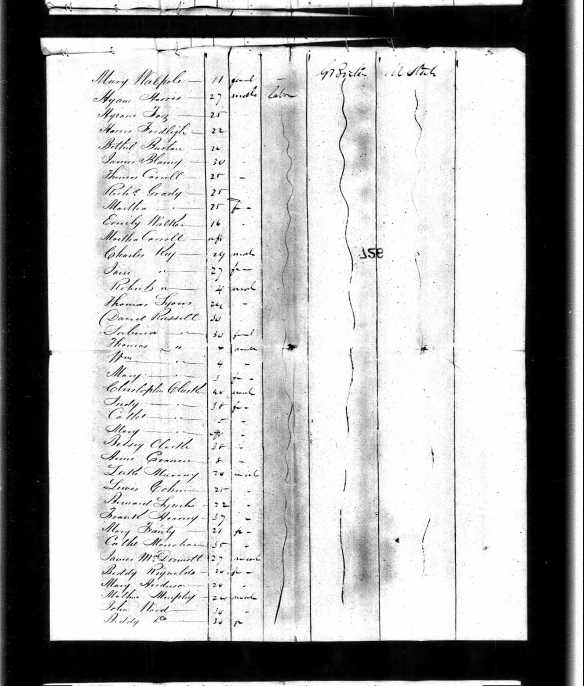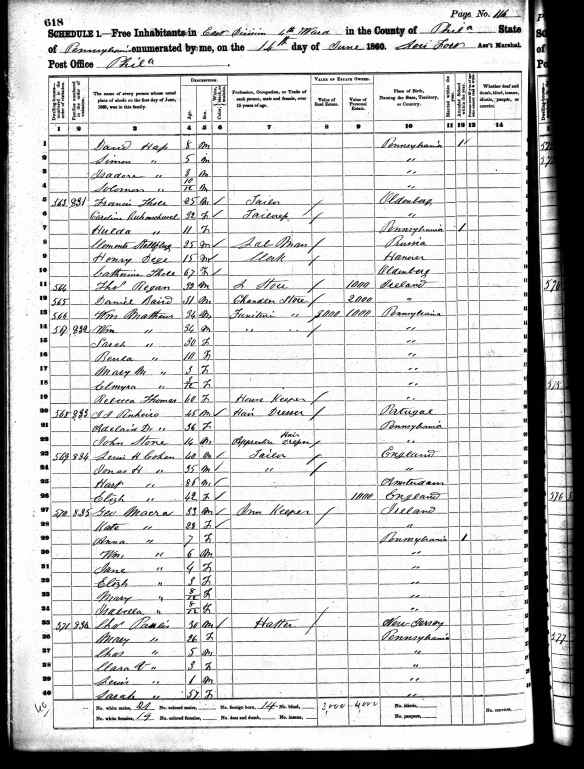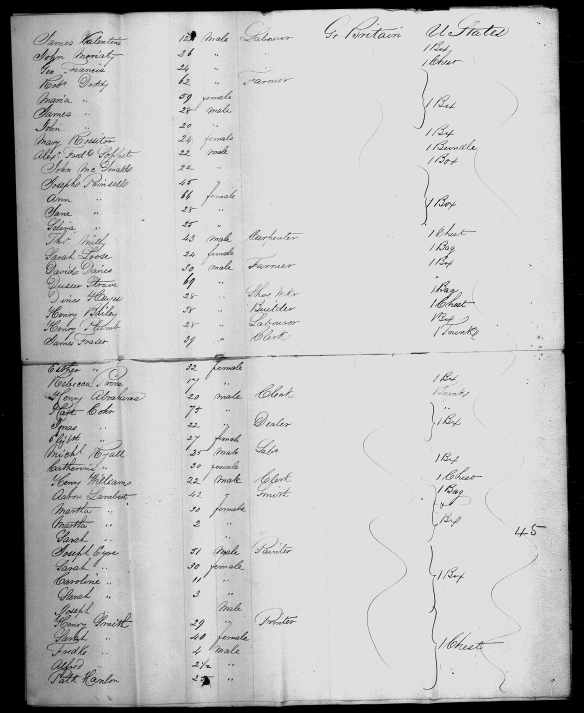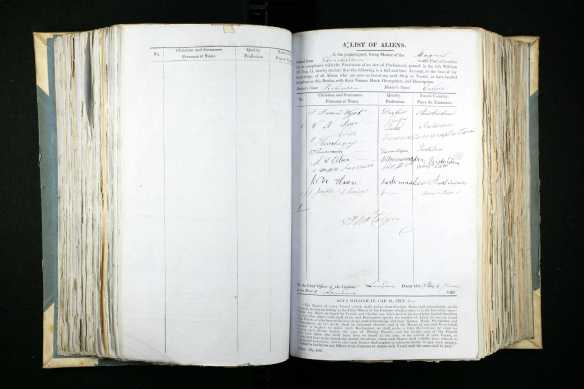
Philadelphia, circa 1860, from the Library of Congress Prints and Photographs Division
By 1860, almost all my Cohen relatives had left England and moved to Philadelphia. Only Moses Cohen remained behind. My great-great grandfather Jacob Cohen had emigrated from England to Philadelphia in 1848 with his wife Sarah and his daughter Fannie. Although I am not certain as to when Lewis, the oldest brother, left England, these naturalization papers dated October 27, 1848, appear to be his, meaning that he had left England earlier than Jacob.
UPDATE: I now believe that Moses also had left England around 1848. See my subsequent post.
I have located one 1846 ship manifest from England to New York with the name Lewis Cohen on it. The ship manifest is for the passenger ship Ward Chipman, sailing from Liverpool to New York, arriving in New York on August 12, 1846.
Neither the ship manifest nor the naturalization papers have enough detail for me to be absolutely certain that either or both relate to my relative, but from the 1860 US census I know that by 1860 Lewis was definitely in Philadelphia, living with his father and siblings.
Just last night I located the ship manifest for Hart, Elizabeth and Jonah. They left England together on the ship Julia Richmond and arrived in New York in September, 1851. Jonah was identified as a dealer, and the manifest indicates that they were coming with only one box.
Interestingly, I also found a document that indicates that Hart may have made a trip to the Netherlands in June, 1851 from England. Although the name is only listed as “HL Cohen” and gives his occupation as “schoenmaker,” or shoemaker, it does give his birthplace as Amsterdam, so it could very well have been Hart. Perhaps he was visiting his birthplace one more time before crossing the Atlantic. Perhaps he was taking Rachel’s body to be buried there. Once I locate Rachel’s death record, I may know more about this trip.
Thus, by 1860, all of the then living descendants of Hart and Rachel Cohen aside from Moses were living in Philadelphia. (I am assuming that Jonas and the John listed in 1841 were the same person.) By 1860 my great-grandparents Jacob and Sarah had had many children. As I have already written, by 1850 they had three children, Fanny, who was born in 1846 in England, and Joseph and Isaac, born in Philadelphia in 1848 and 1850, respectively. In the next decade, Sarah gave birth to six more children: Hart (1851), Rachel (1853), Reuben (1854), Maria (1856), Hannah (1857) and Elizabeth (1858). All of the children except the youngest three were in school. That made a grand total of nine children born between 1846 and 1858, and there were several more born in the next decade as well, including my great-grandfather Emanuel. I find it interesting that contrary to the traditional Jewish practice of naming a child after a deceased relative, Jacob named a son Hart in 1851 before his father Hart had died and named a daughter Elizabeth while his sister Elizabeth was still alive. Rachel presumably was named for Jacob’s mother who had died before 1853.
Although Jacob’s occupation is listed as a tailor on the 1860 US census, this seems inconsistent with the earlier census in 1850 when he was a dealer in second hand goods and with the 1841 English census when he was working as a china dealer. Perhaps the census taker heard “dealer” as “tailor”? Since Jacob also had the most assets of anyone else listed on this page of the census, $1000 in real estate and $2000 in personal property, it seems more likely that he was a merchant than a tailor. He also had three servants living in the household: Eliza Mackey, Mary McDonough, and Margaret Gallagher. There was also a 24 year old man named Lazarus Jacobs living with the family; this might have been a cousin through Jacob’s mother and/or his wife Sarah since both were Jacobs by birth. Jacob thus had nine children, an adult relative, three servants as well as his wife Sarah and himself to support in 1860. Could he have been making such a good living as a tailor?
Interestingly, Lewis and Jonah were also listed as tailors on the 1860 census. They were living in the same district as Jacob, the 4th Ward, East Division, and the census appears to have been taken by the same census taker, although the signature is hard to decipher. Were their accents so difficult for this census taker to understand? Or were these three brothers really tailors? Lewis, Jonah, Elizabeth and their father Hart were all living together and had $1000 in personal assets, more in line with the shop owners on the census pages than the tailors, but perhaps the three Cohen brothers were all very successful tailors. However, according to the 1863 Pennsylvania Septennial Census, a census taken of all taxable residents, Lewis and Jonas were then engaged in sales and Jacob was listed as a dealer, not as tailors, so I am still inclined to think that the 1860 census taker heard “dealer” as “tailor” for all the Cohen men.
As I puzzled over this particular question of whether or not they were tailors, I became curious about the neighborhood they lived in and the socioeconomic character of that neighborhood. This led me to wonder about the history of Jews in Philadelphia and to ask why this family settled in Philadelphia, not New York, despite having sailed into New York when immigrating to this country. I am now doing some preliminary research into those questions and will report back on what I learn.
What has struck me as particularly interesting as I research and report on the immigration of my Cohen ancestors to Philadelphia is how different it feels from the immigration of my mother’s family, the Brotmans, Goldschlagers and Rosenzweigs. Unlike the rather desperate conditions that my mother’s family faced in their home countries and the poverty they experienced after coming to the US, my Cohen ancestors left England not because they were oppressed or poor but for better conditions and opportunities here in America. Although I am sure they faced some anti-Semitism and some isolation as Chuts and were not wealthy but at best middle class merchants, they came to America for less drastic reasons and with far more advantages than my mother’s relatives. Not only were they more economically secure, they came speaking English. They did not have to struggle to understand a new language, which must have made their adjustment far easier than it did for my Galician and Romanian ancestors who spoke no English when they arrived.
By 1860, the Cohens were settled in America and some of them were already or soon to be American citizens. They were here a good 40 years before the Brotmans and some of the Rosenzweigs and about 50 years or more before many of the Goldschlagers and the other Rosenzweigs. My father’s other lines also arrived here far earlier than my mother’s family. My parents represent in many ways a merger of the two distinct waves of Jewish immigration to America. When they were growing up, there was still a distinct class line between the older Jews from Western Europe and the newer Jews from Eastern Europe. Today we don’t even think about those distinctions, except in historical terms. But the two groups started differently and arrived under different conditions, creating for many years an economic and cultural gap between them.










Were the three women their servants … or perhaps boarders who worked elsewhere but lived with your family and paid rent or contributed services? What kind of structure did they live in? And what drew them to Philadelphia? Why not remain in NY where they landed?
LikeLike
Good questions, and exactly what I am looking into now—what their neighborhood was like and what drew them to Philadelphia. Stay tuned…
LikeLiked by 1 person
Your family made some very interesting journeys, Every branch of your family which arrived in America must have left some incredible stories about their journeys. Sadly, the many family members left behind faced a horrible uncertainty in Europe. My surname ‘Kuta’ is Eastern European Polish/Ukrainian and my grandfather ‘Jan Kuta’ spent his teen years in a Nazi labour camp. Most of his family left for America (sadly that history and their names are lost),
LikeLike
I do wish it was easier to break down the brick walls of Eastern European genealogy, but so many of the documents and thus the names of people are lost. So tragic. When did your grandfather go to England? How did he escape from the Nazis? Do you know why he was in the labor camp?
We all have so many tragic, sad stories, but also so many heroic, triumphant stories to share.
LikeLike
Hi Amy, here is a link to a story I published here on WordPress about my grandfather Jan Kuta.
I have a long way to go in finding more information about his family, but sadly may need to wait until the Ukraine relax there policies on public records and the trouble they are currently experiencing has settled down. I don’t know much about his history at all really, I can only get an idea from what history tells us of the area he came from.
Hope all well.
LikeLike
Thanks, Stephen. I left a comment at your site. I also would love to go to Ukraine—my husband’s family is from that region. But not this year…
LikeLike
Pingback: Hart Levy Cohen and Family 1860 to 1870: A Decade of Transition « Brotmanblog: A Family Journey
Pingback: Who Knew? My Great-Great Grandmother’s Family, the Jacobs « Brotmanblog: A Family Journey
Pingback: Changing of the Guard: 1870 to 1893 « Brotmanblog: A Family Journey
Pingback: Science versus Inference: Was Moses Cohen the Brother of Jacob Cohen? « Brotmanblog: A Family Journey